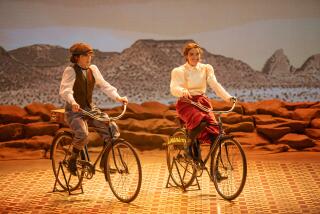‘Gangsta Love’ Falls Short of Expectations
- Share via
Four actors are onstage in “Gangsta Love,” but 22 are in the play’s filmed segments. The production has six principal designers (and several lesser ones), a composer, a sculptor, a dramaturge, a creative consultant and two boxing trainers. Writer-star Dahlia Wilde credits four consultants, two attorneys, a management company, a DJ and an acupuncturist--among others--in the program.
With so many troops toiling away, something big was expected. With a boxing ring at the Paolina Boxing Club turned into a stage, something original was expected. With a director (Vincent Paterson) who choreographed “Kiss of the Spider Woman” and the “Evita” movie, something splashy was expected.
Expectations were too high.
“Gangsta Love” is an overproduced almost-solo show, similar to Claire Luckham’s “Tanzi.”
While “Tanzi” (known variously in these parts as “Tarzana Tanzi,” “Tujunga Tanzi” and “Turbo Tanzi”) told the story of a woman’s empowerment through rounds at a wrestling match, “Gangsta Love” does the same through rounds in a boxing arena.
Unlike most boxing matches, where there are two well-defined rivals, most of “Gangsta Love” features only Wilde onstage. Her opponent, represented by an inert statue at the back of the ring, is the “victim brain” of her own character, Ramona Saperstein, who is looking back on her life after receiving a knockout blow while boxing in a bluegrass music video.
This means that the show consists primarily of Wilde’s Ramona prowling the ring and its ropes, reciting her personal saga--from young Central Park rape victim to international student to abused wife to hospitalized crack-up patient. Finally reduced to homelessness in L.A., Ramona finds a home, a fighting spirit and a nickname (“Muhammad Dali”) at, yes, the Paolina Boxing Club.
Only at this point does Wilde interact with another human being onstage--Henry Brown, playing her trainer at Paolina. However, off to the side sit two other actors, Annie Abbott and Allen Bloomfield, playing Ramona’s stereotyped Jewish parents. They bridge the gaps between rounds with comic patter and caustic comments about their daughter and also flip over the cards that tell the audience which round is coming up.
Meanwhile, lavishly produced film segments fill up the backdrop, behind the ring, underlining Wilde’s comments with excessive literalness. The filmed material distracts almost as much as it emphasizes.
The same can be said of other gimmicks in the production, including the script. Most of it uses singsong rhymes (presumably to reinforce the gangsta in the title with allusions to rap), but Wilde doesn’t sing, figuratively or literally. The artifice is too often nothing more than arty, too far removed from the harsh incidents that are its ostensible subject. The street poetry sounds fake.
And the attempt to cram so much miniseries-style narrative into a few lines sounds superficial. Subjects come and go without much time to digest them--a mob hit on one of Ramona’s acting teachers, for example, or a brief reference to Bosnia. Except for Ramona herself, most of the characters are made of cardboard.
Even the cachet of locating the production at a real boxing club has its disadvantages. Although I was ushered to a seat on the floor instead of on the side--so I could see the projections better, I was told--the sight lines still weren’t great.
* “Gangsta Love,” Paolina Boxing Club, 726 S. La Brea Ave., Los Angeles. Wednesdays-Thursdays, 8 p.m. Ends Nov. 14. $22.50. (213) 660-8587). Running time: 1 hour, 30 minutes.
More to Read
The biggest entertainment stories
Get our big stories about Hollywood, film, television, music, arts, culture and more right in your inbox as soon as they publish.
You may occasionally receive promotional content from the Los Angeles Times.










